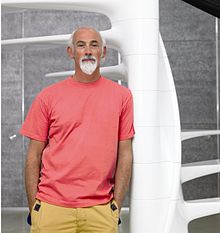Ross Lovegrove
| Ross Lovegrove | |
|---|---|

Lovegrove in 2007
|
|
| Born | 1958 (age 58–59) Cardiff, Wales |
| Alma mater | Manchester Polytechnic |
| Occupation | Industrial Designer |
| Website | RossLovegrove |
Ross Lovegrove (born 1958 in Cardiff, Wales) is a Welsh artist and industrial designer.
Ross Lovegrove was born in Wales and in 1983 graduated from the Royal College of Art in London with a Masters Degree in Industrial Design, showing seminal works; Kodak Digital Camera and Equestrian Chaise long.
Scouted by Frogdesign in Germany, then considered the world’s leading design studio to head up advanced innovation on Apple and Sony programmes leading to advances in the dematerialization of the Sony Walkman and developments in portable computers and accessories.
Joining Knoll International in Paris he created the revolutionary Alessandri office system understanding the fusion between high culture, technology and art, aligning with Design and Architectural greats such as Ettore Sottsass, Isamu Noguchi, Harry Bertoia and Saarinen in Organic Design.
At the age of 27 he was selected to be amongst the 5 top French Designers with Jean Nouvel and Philippe Stark to be a member of the Atelier De Nimes.
In 1998 he was awarded the Medaille De la Ville de Paris.
Establishing Studio X in London in 1990 he built his current studio next to the original studio of David Hockney in Notting Hill.
Zaha Hadid mentioned that “Ross’s studio is a wonderland of form and technology like stepping into a space ship”
Ross Lovegrove creates incredibly sophisticated forms from cars, to aircraft interiors, cameras, watches, bicycles and even everyday objects like water bottles Regarded as the true modern master of sculpting materials and technology known as Captain Organic, his design language is of unparalleled influence on the new emerging generation of designers with a heightened awareness of emotional intelligence in the field.
Lovegrove still drives the very first all aluminium Audi A2 imported into the UK almost 15 years ago, is an environmentalist, humanist and advocates that “one cannot be human-centric without first being earth-centric“.
He is not a consumerist but collects the drawings of Henry Moore, Anonymous Primordial Objects and Tribal Art, rarified artifacts of depth and meaning and it is his love of the opposite polarities of the Deep Past and the Deep Future that humanist entrepreneurs and innovators seek out today in order to relate their projects to the bigger picture of life on Earth from spaceships to visions for Science fiction movies recently to Facebook's new handheld tablet.
His respect for and understanding evolution's principles and nature took him recently to the Galapagos Islands with Richard Dawkins to reinstate his understanding of biodiversity and to discuss the possibility that creativity itself can have a gene.
...
Wikipedia
